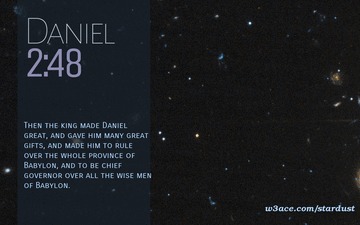Click here to return to Blog Post Intro
Daniel Had What It Took
Daniel illustrates how the private life of a leader impacts his or her public life. Daniel could have tried just to survive his experience as a captive in a foreign land, but he never left his disciplined life of character and personal commitment.

Consider the character he displayed during times of testing under the kings of Babylon:
- His Diet: He wouldn’t compromise on ritually unclean foods, but ate only vegetables.
- His Motives: He didn’t take credit for interpreting dreams but glorified God instead.
- His Honesty: He spoke the truth to authorities, regardless of its unpopularity.
- His Disciplines: He continued praying daily, even though it might cost him his life.
- His Integrity: He had no interest in bribes or payoffs.
- His Convictions: He stayed committed to his friends and beliefs even as he rose through the ranks.
We have no control over a lot of things in life. We don’t get to choose our circumstances, but we do choose our character. We create it every time we make choices.
How a leader deals with the circumstances of life tells you many things about his character. Crisis doesn’t make character, but it certainly does reveal it. Adversity makes a person choose one of two paths: character or compromise. Every time a leader chooses character, he grows stronger.
Herod Lacked Character and Lost Everything
From Acts 12, we see that ego drove King Herod Agrippa I of Paul’s day, just as it had driven his father and grandfather. They all desperately lacked character.
Herod’s lack of character provides us with many examples of what not to do as a leader:
- He mistreated his own citizens (v. 1). He unjustly ordered the arrests of Jewish believers in order to harass them.
- He executed innocent people (v. 2). He had James killed by the sword, even though he had committed no crime.
- He made decisions based on popularity (v. 3). When he saw it pleased the Jews to kill James, he had Peter arrested too.
- He acted irrationally in difficult times (v. 19). He killed the 16 guards who had been on duty at the time of Peter’s prison escape.
- He harbored anger toward others (v. 20). He remained angry toward outside ethnic groups and looked for a way to get even.
- He sought power out of insecurity (v. 20). He enjoyed controlling others and especially loved having people at his mercy.
- He projected an infallible image (v. 21-22). He loved wearing his royal garb and being worshiped.
- He was blinded by his ego (v. 23). He lived in an unreal world and couldn’t see how his ego sabotaged his leadership.
How do we avoid Herod’s trap?
- Search for the cracks. Evaluate the major areas of your life, and identify where you’re weak or vulnerable.
- Look for patterns. Do any weaknesses remain? Patterns can help you diagnose character flaws.
- Face the music. Character repair begins when you face your flaws and apologize to those you’ve wronged.
- Stay teachable and rebuild. Once you face your past, create a plan to build inward strength.
The last few days, our upstairs sink has overflowed. Yesterday, I spent some time cleaning out the Air Conditioning drain line. After that line was clean, the sink continued to fill up. Today, I took a look at the main drain line. Using a wire snake, I was able to remove a bunch of gunk and nasty stuff from the line. When you think about it, our inner character is much like those pipes. You really can’t see them from the outside. However, if they get too mucky, you start to see indications on the outside… Only by cleaning them out does everything flow nicely again. Is there any “muck” you need to deal with? Maybe the lessons from Herod can help…
Either way, keep in mind that character communicates credibility, harnesses respect, creates consistency, and earns trust.
Out of This World Leaders need to start with Strong Character…

